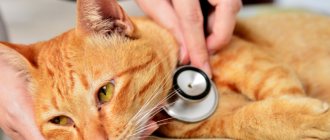Feline immunodeficiency virus (FIV)
Feline immunodeficiency virus (FIV) is an infectious disease that attacks the animal's immune system. The second name of the disease is FIV (feline immunodeficiency virus). The causative agent of this infection is a lentivirus (FIV virus).
Lentivirus differs from others in that it can infect neighboring cells without dividing, through direct contact (using “ribbons”)
According to researchers, this infection is widespread in the world: from 2% in Taiwan to 29% in Australia.
Marusheva Yu.A., Belyakova A.S., Determination of the role of stray cats in the epizootic process during FIV infection, Bulletin of AIC Stavropol
https://stavapk.elpub.ru/jour/article/view/18
The causative agent of the insidious disease was first discovered in 1986 in a cattery (California, USA). The virus itself is similar to the causative agent of AIDS that affects people, but it is not the same thing. The FIV virus mainly has a pathological effect on T-lymphocytes, as if leaving the cat without immunity, but an infected cat can live a long life if its owner does everything right.
The danger of this disease lies in the fact that in parallel with AIDS, a cat can develop other diseases (from infectious and fungal diseases to oncology). FIV-infected cats often develop leukemia. After all, an animal whose body is not protected by immunity is subject to attacks by all kinds of viruses, bacteria and other pathogenic factors. A sick cat cannot resist illnesses, so often pets with FIV die from concomitant diseases, and not from the virus itself.
Is FIV transmitted to humans?
The FIV lentivirus is specific in that it cannot be transmitted to humans (just as human HIV is not transmitted to cats). However, owners of infected cats will still need to exercise some vigilance.
I heard a sad story about a cat named Charlie Sheen. A red stray cat was picked up by a compassionate girl. The animal was too lethargic and weak, and its eyes almost did not open. The new owner took the cat to the veterinarian, who discovered AIDS in the poor fellow. And although the girl could not get this virus from a cat, the veterinarian warned her about other dangers.
Many people, having learned about the terrible diagnosis of their pets, move away from the animal for fear of becoming infected.
The fact is that the body of cats with FIV is an entry point for all kinds of infectious diseases. A person can “catch” secondary infections and viruses:
- ringworm (a fungus that affects the skin);
- leptospirosis (affects the kidneys and liver);
- worms;
- diseases caused by protozoa;
- rabies, etc.
That is why doctors and veterinarians recommend limiting contact of infected animals with children under 12 years of age. A child can become infected with something, because children’s immunity is still too weak and their body is vulnerable.
Incubation period (or virus carrier stage)
Rhinotracheitis in cats: symptoms and treatment at home Why is it so important to know everything about FIV in cats, that is, what is it and how does it manifest itself? Because with this disease, an animal can live a long time, and at the same time a full life, but only if treatment is started in time.
And for this you need to know how the incubation period proceeds and what signs it manifests itself. The fact is that the primary stage lasts only about 4-6 weeks, and it is accompanied by clinical symptoms of an acute viral infection. And then there may be a long latent period before new signs appear.
[custom_ads_shortcode1]
Methods of infection
The feline immunodeficiency virus spreads in the same way as the virus that causes AIDS in humans:
- sexually;
- through saliva (during bites);
- through blood (for example, by scratching or transfusion);
- during grooming (when one cat licks another);
- through the placenta (intrauterine infection of kittens).
The risk group includes unneutered yard cats (the virus spreads during fights) and stray cats and cats under 10 years of age (sexual transmission).
Mating is one of the ways to become infected with FIV.
Biologists of the Saratov State Agrarian University named after. N.I. Vavilova believe that accidental touch does not matter (the virus quickly dies in the external environment), but through bites and scratches the animal can become infected. Regarding infection during mating, scientists have divided opinions: some suggest that the virus is transmitted with the male’s sperm, others are inclined to believe that FIV enters the body when the cat bites the female on the withers during mating.
The pathogenic feline immunodeficiency virus is found in all biological fluids: blood, lymph, saliva, etc. An infected cat can lead a normal life for a long time, and the disease will not manifest itself. The first signs of infection may appear when pathogens of secondary diseases become active in the animal’s body.
Symptoms of the disease
After the incubation period (it lasts up to one and a half months), symptoms of an acute disease will appear:
- high body temperature (up to 40 degrees);
- enlarged lymph nodes (can be felt);
- diarrhea, loss of appetite, dehydration;
- lethargy, weakness, apathy;
- inflammatory and fungal skin diseases (dermatitis, lichen, etc.).
An attentive owner should notice changes in the cat’s well-being
Then comes the latent period, which lasts up to 3 years. Symptoms may disappear even if there is no treatment. At this time, the animal will continue to develop and accumulate chronic diseases, since there will be fewer and fewer lymphocytes, and the body will not be able to fight all aggressive factors. Therefore, veterinarians often detect AIDS in cats several years after infection, and the date of infection cannot be determined. No less often, specialists diagnose FIV at a stage when the animal can no longer be helped. Symptoms of chronic illnesses may include the following:
- inflammation of the mucous membrane of the gums and mouth (stomatitis, gingivitis, etc.);
- disturbances in the gastrointestinal tract (gastroenteritis, diarrhea, etc.);
- chronic runny nose, conjunctivitis, lacrimation, etc.;
- problems with the respiratory system (laryngitis, bronchitis, pulmonary edema, etc.);
- inflammation of the ear canal;
- atrophy of the lymph nodes;
- skin diseases;
- lack of appetite leading to exhaustion;
- inflammatory processes of the urinary tract.
The symptoms of a long-term disease are very diverse, so the veterinarian may not notice the virus itself. Usually, special attention is paid to all concomitant diseases, and treatment is aimed at eliminating the symptoms that cause trouble for both the cat and its owners. The lack of immunity in an animal will provoke the development of incurable diseases that will lead to its death (old cats with FIV are at risk of dying from cancer, for example, of the lymphatic system).
Photo gallery: some symptoms of a viral infection
The first symptom that appears in case of infection is high temperature
Inflamed lymph nodes can be felt on the cat's neck
Diarrhea is a common symptom when a cat is infected with the FIV virus.
Skin problems can be anything from lichen to allergic dermatitis
Lethargy, apathy, weakness are a sign of many diseases
Tests required for diagnosis
Not all specialists are able to discern the symptoms of an aggressive virus at the initial stage of its development. Signs of FIV can be identified using a number of studies:
- general clinical blood test (there will be few red blood cells, neutrophils or lymphocytes);
- biochemical blood test (increased protein content in the blood);
- determination of antibodies to the virus in the blood (if such an analysis is done on the initiative of the cat owner, then at least 3 months must pass after the expected date of infection);
- polymerase chain reaction - PCR (detection of the virus using multiple DNA amplification);
- serological ELISA tests;
- Western blotting - detection of specific proteins in the blood (this method is used only in special scientific laboratories).
Stage of penetration into the body
After entering the blood, the virus is introduced (replicated) into cells sensitive to it - white blood cells. At this stage, the disease does not manifest itself clearly:
- slight increase in temperature;
- inflammation of the lymph nodes;
- increased fatigue.
[custom_ads_shortcode2]
How to treat immunodeficiency virus in adult animals
Cats suffering from FIV infection are treated symptomatically, and it is not yet possible to get rid of the virus itself.
Viral immunodeficiency, unfortunately, cannot be cured, but it is possible to maintain a decent life for an animal.
Svetlana Vladimirovna Spiridonova, veterinarian
https://www.zoovet.ru/forum/?tid=7&tem=985123
Many owners of sick cats, after consulting with a veterinarian, decide to support their pets with antiviral drugs. However, not all experts believe that this helps the animal. The fact is that if you start giving your cat medications to boost immunity and then abruptly stop using them, the animal’s body will malfunction. The virus will increase its negative impact on the body, and the cat will become worse. Therefore, if you decide to support your pet with such drugs, then know that this is forever. The following drugs are usually prescribed as such drugs:
- Anti-influenza immunoglobulin (or anti-measles);
- Zidovudine (in parallel with the use of the medicine, you need to monitor your blood condition - take tests every week);
- Virbagen Omega (Feline interferon-w) is a recombinant interferon for cats.
Photo gallery: antiviral drugs to support the cat’s body
Virbagen Omega was developed specifically for animals, so it does not cause any side effects, but some veterinarians consider this drug to be ineffective
Zidovudine (Retrovir) is developed for humans, so it may cause side effects (vomiting, anemia, etc.) in cats.
Medicines that were created to treat people with HIV infection can be expensive (depending on the manufacturer)
In addition to antiviral drugs, immunomodulators and immunostimulants may be prescribed. Their effectiveness in FIV has not been proven, but there is no data on the harm of these drugs. Medicines that support the affected immune system of a cat can fight some secondary infections. Typically, animals are prescribed one of the following immunostimulants:
- Glycopene (available in tablet form, dosage depends on the weight of the animal);
- Anandin (cannot be used to treat cats with renal failure);
- Fosprenil;
- Roncoleukin;
- Ribotan;
- Polyferrin-A;
- LTCI (T-lymphocyte immunostimulator) is considered one of the most effective drugs for FIV.
Photo gallery: immunomodulators and immunostimulants for FIV
Anandin should be used with extreme caution (many side effects)
Polyferrin is a protein preparation of lactoferrin, not sold in every veterinary pharmacy.
Immunodeficiency is the main indicator for taking Ribotan, but the drug can cause an allergic reaction
Fosprenil is one of the most popular immunomodulators for maintaining the immunity of cats.
Roncoleukin is based on a yeast strain, so the active substance can cause allergies
Glycopene must be used regularly; even one missed dose of the medication can lead to “zeroing” the effectiveness
To suppress pathogenic microflora, the veterinarian may prescribe antibiotics:
- ampicillin;
- Ampiox;
- cephalosparin;
- penicillin, etc.
To make the antibiotic more effective, it is sometimes combined with corticosteroids. But there is a caveat: when choosing such drugs, the veterinarian must ensure that the recommended drug does not reduce immunity. In addition, a cat with immunodeficiency may be prescribed antihistamines:
- Diphenhydramine;
- Suprastin;
- Pipolfen;
- Loratadine;
- Tavegil, etc.
Photo gallery: antihistamines for immunodeficiency
Antihistamines can relieve itching, swelling and allergic reactions
Many antihistamines have a sedative and hypnotic effect
Sedatives can relax smooth muscles and relieve pain
Some antihistamines have an antiemetic effect
The immunodeficiency virus suppresses the activity of the bone marrow, which can cause hematological disorders (neutropenia, lymphopenia, anemia, etc.).
When children ask me what anemia is, I explain, as they say, on my fingers. Blood consists of cells of different colors. When there are few red erythrocytes in the blood, anemia (anemia) develops. And when there are not enough white blood cells in the blood - lymphocytes - this is called lymphopenia. With this disease, the body loses its main immune soldiers, because lymphocytes are needed to fight infections. Neutropenia is one of the conditions associated with lymphopenia.
To combat these conditions, the following drugs are prescribed:
- Neupogen, Leucostim, Filgrastim, etc. (for neutropenia);
- Epocrine, Epoetin Beta, Erythrostim, etc. (for anemia).
Photo gallery: drugs prescribed for hematological disorders
The international name of Neupogen and Leucostim is Filgrastim
Recormon and similar products are well tolerated by cats, so they can be used for a long time
An analogue of Epoetin Beta is the drug Epocrin
To correct hematological conditions, you can choose a domestic or imported drug, the difference will only be in the cost of the drug
Blood transfusions are sometimes indicated in the treatment of anemia. This procedure gives a good result, so you can quickly and effectively achieve an increase in red and white blood cells. However, transfusion is not available in every clinic, and this procedure only gives a temporary effect. Foreign blood cells can cause anaphylaxis (a rare type of intolerance) - this phenomenon can kill the cat.
Usually all treatment comes down to taking vitamins and fighting secondary infections. The fact is that antiviral drugs and bone marrow stimulants are not cheap. For example, the price for 1 ampoule of Neupogen can reach 5 thousand rubles, and a package of Erythropoietin can reach 4 thousand rubles. Some drugs are not sold in Russia at all, so loving and desperate cat breeders order imported drugs, which are even more expensive. In addition, veterinarians rarely prescribe such effective remedies, since feline AIDS is not always diagnosed.
But not everything is as sad as it seems. Compared to people who have HIV infection, cats with FIV can survive. Cases of animal deaths from AIDS are rare. The life of domestic animals is much shorter than that of a human, so infected cats do not have time to feel the full impact of the insidious virus. Even if the diagnosis is made at the age of 10 years, and the owner supports his pet with medications and care, the animal can live for another 5–8 years. And the average life expectancy of cats is 15–16 years. Therefore, there is no need to despair and resort to extreme measures. On the contrary, give your pet more attention and care, and he will thank you with a happy purr.
Do kittens get sick and how to treat them?
Kittens can also get AIDS, but this is rare. Since, most likely, the infection occurred from the mother cat, you can initiate an examination of the baby. If your cat feels unwell, and you suspect she has FIV infection, then she and all the kittens should be taken to the veterinarian.
Kitten owners are worried that their little pets may be infected at an early age
Treatment for kittens is the same as for adult animals. The only difference will be in the dosage of the drugs. Firstly, this is due to the fact that in babies the immune system is not fully formed. If from an early age a cat lives entirely on artificially acquired antibodies, then in the future the animal’s body will not be able to independently resist even mild infections. And secondly, many drugs prescribed for FIV are created for treating people, and this is a completely different concentration of active substances.
In the case of immunodeficiency in kittens, everything depends on the veterinarian. The specialist must not only recognize the infection, but also prescribe competent support for the baby’s body. It may also be that FIV infection in a kitten is in a latent state. In this case, you don’t have to stuff the animal with strong drugs. This will require proper care, because the owner will have to protect his pet from viruses and infections. Some cat breeders, when a virus is detected in kittens, think about euthanizing them, but I believe that this is inhumane.
Treatment method and prognosis
Unfortunately, it is impossible to cure immunodeficiency. A cure for it has not yet been invented. All therapeutic measures are aimed at eliminating symptoms and associated pathologies, strengthening the immune system and prolonging the life of the animal.
Activation of the immune system of a sick cat is achieved through the use of immunomodulators Gamavit, Gamapren, Immunofan. Veterinarians also note the effectiveness of drugs such as Interferon, Roncoleukin, and anti-influenza immunoglobulin.
An important stage of treatment is vitamin therapy. To strengthen the animal’s immunity, ascorbic acid and vitamins A, B, E, and D are prescribed.
Anti-inflammatory drugs and antibiotics are indicated to eliminate inflammatory and infectious diseases. Prednisolone and Dexamethasone are prescribed as corticosteroids.
With good care and proper treatment, cats with immunodeficiency may well live for another seven years. Stray animals, weakened individuals - no more than three.
With a terminal course of the disease, the prognosis is cautious. As a rule, the life expectancy of sick cats in such cases does not exceed two years.
Caring for a sick animal
If your pet is diagnosed with FIV, remember the following rules:
- A sick cat should not be allowed outside (this is to prevent infection of other animals and protect your pet from various infections).
- Such animals need to be neutered.
- Immunocompromised cats should not be vaccinated.
- Every six months you need to undergo examinations (body weight, examination of lymph nodes, eyes, skin, etc.).
- Blood tests (general and biochemical tests) should be performed once a year.
The owner of an infected pet will have to follow some rules for caring for the cat.
In addition, you will have to give your cat the medications prescribed by the veterinarian. If there is a risk of missing any medication, you can ask a relative. It is also worth using the services of a cat hospital. In veterinary clinics where this service is provided, veterinarians are on duty around the clock - they will give the necessary injections and give pills. I have used a similar service: it is inexpensive, and the supervision of professionals is much better than the help of relatives.
In addition, the sick cat is prescribed a diet (for this you need to consult with the treating veterinarian). The food of an infected animal must be carefully balanced and healthy.
Preventive measures
There is no special preventive vaccination against feline AIDS yet, but there are vaccines that have a wide spectrum of action. For example, in 2002, American scientists created the Felovax vaccine (Fel-O-Vax FIV, Fort Dodge Animal Health). This vaccination can only be given to healthy cats and kittens over 8 weeks of age. Studies have shown that up to 80% of cats were protected from AIDS with the help of this drug. However, there is a caveat here: such an injection can cause soft tissue sarcoma at the injection site, so only those cats that are most susceptible to infection are vaccinated.
Vaccines can protect your cat from AIDS
In Russia, few people vaccinate their pets with such drugs. Most preventive measures are aimed at limiting the possibility of infection:
- excluding the possibility of the cat freely walking and communicating with street animals;
- castration of cats (allows to reduce the number of fights between them);
- castration/sterilization of infected cats (excludes infection of kittens, including intrauterine);
- isolation of cats with immunodeficiency from healthy animals;
- testing all newly acquired cats for the presence of the virus;
- mating only with proven males;
- If a cat is planned to be included in a breeding program, then it needs to be tested and vaccinated.
Feline immunodeficiency and HIV infection in humans are similar diseases, but FIV is not dangerous for humans. Infected cats can live long and happy lives, even though feline AIDS is incurable. However, to maintain the normal life of a virus-carrying cat, lifelong treatment may be required.










